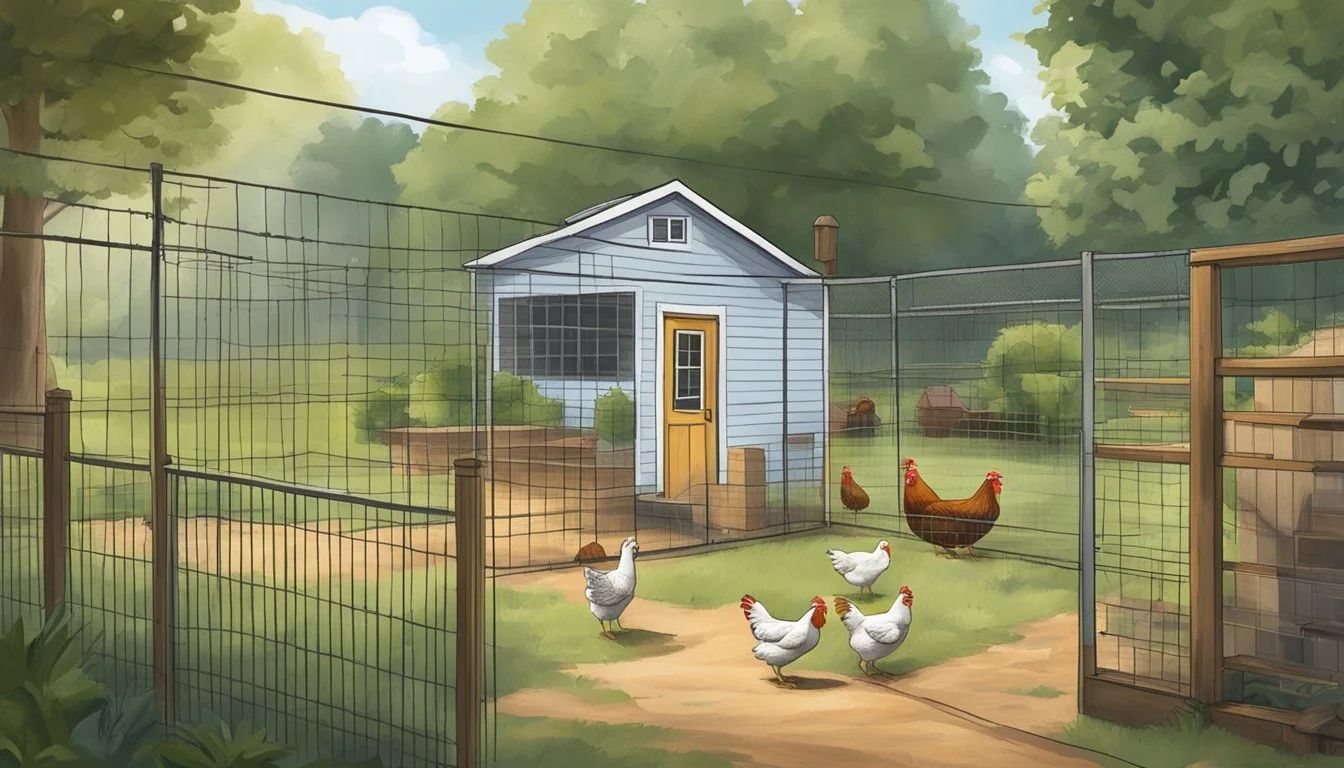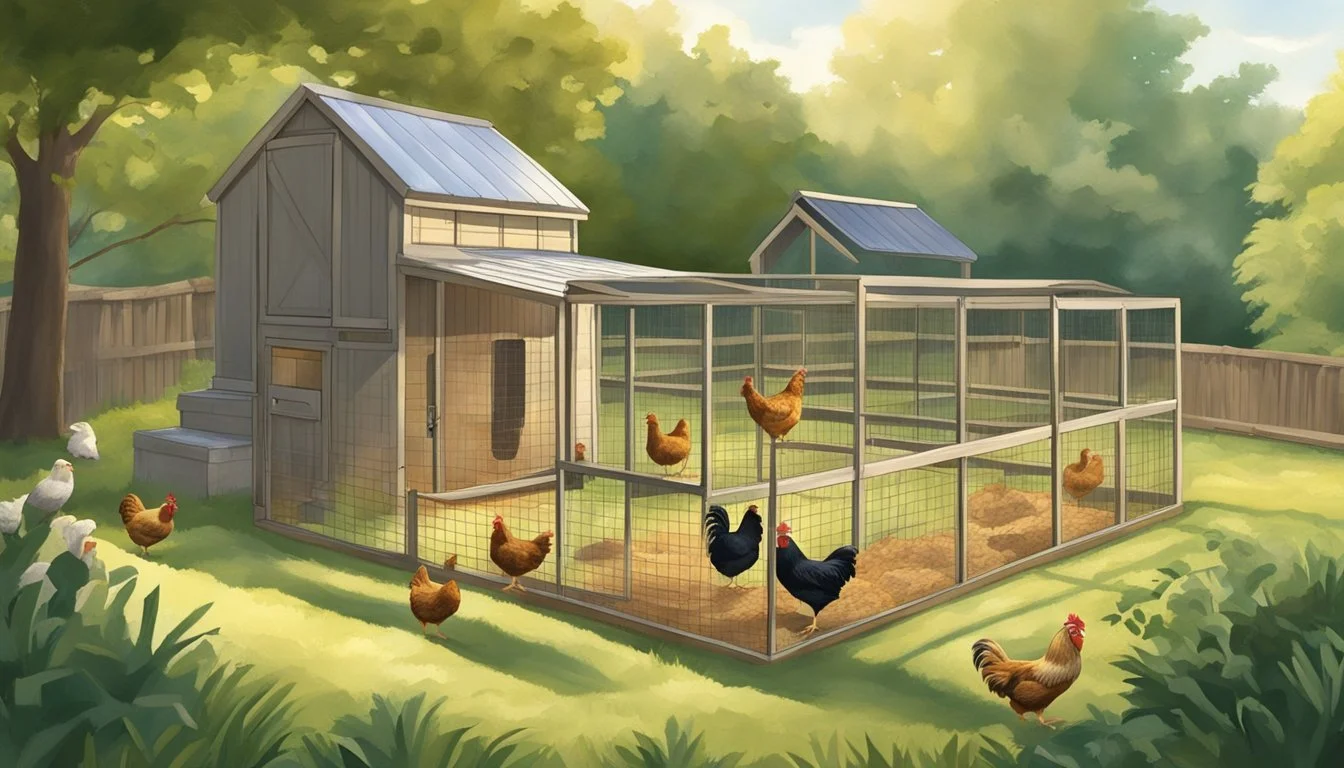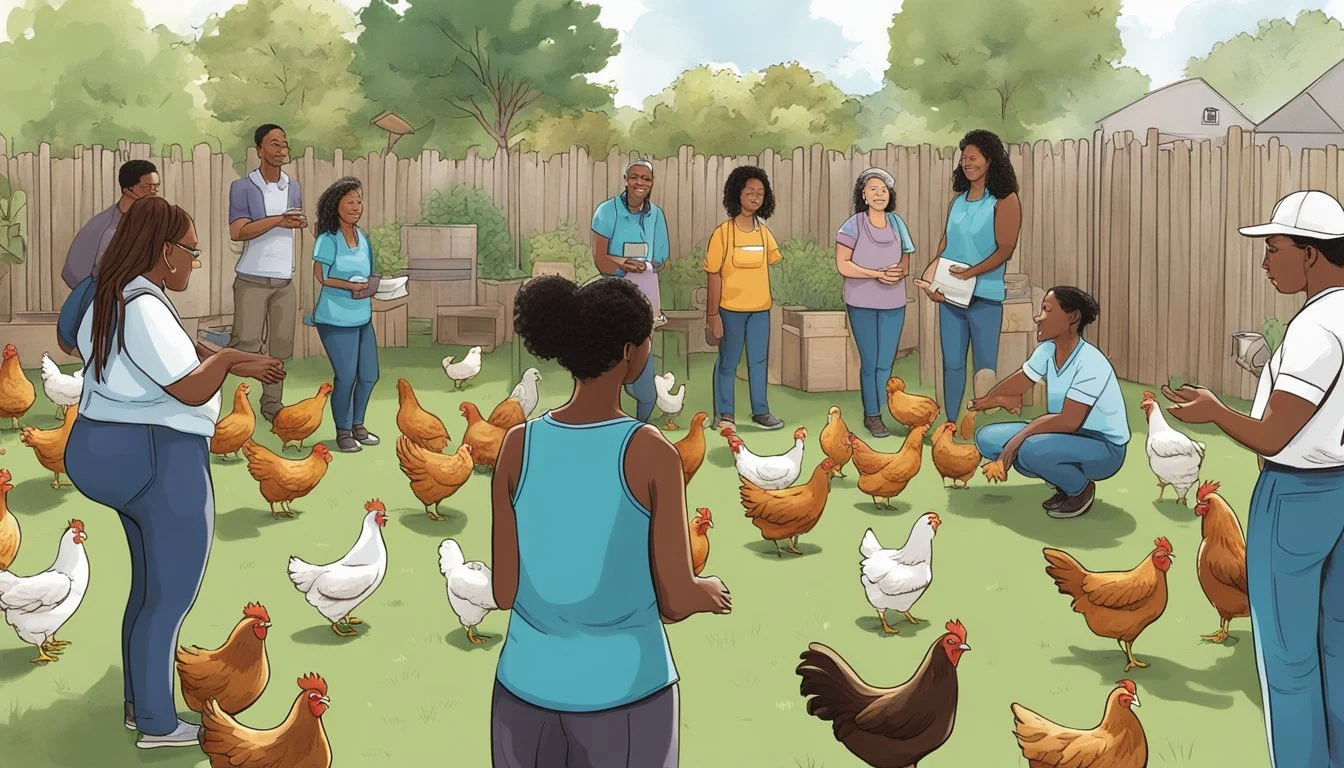Keeping Backyard Chickens in Athens, GA
A Guide to Local Regulations and Best Practices
Backyard chicken (how long does chicken last?) keeping has become an increasingly popular activity for residents of Athens, Georgia, aligning with a broader trend of urban and suburban homesteading. Recognizing this interest, the Athens-Clarke County has established specific ordinances that enable households to engage in this practice, ensuring it aligns with the community's health, safety, and zoning regulations. These rules help maintain harmony between animal husbandry enthusiasts and their neighbors while fostering responsible urban farming practices.
In Athens, homeowners are allowed to keep chickens in their backyards but with certain conditions. For instance, a permit is required for residents to maintain a flock, and there's a cap on the number of chickens one can own, with roosters generally prohibited due to noise concerns. These measures prevent potential nuisances and promote the welfare of the chickens. Compliance with health and safety guidelines is also mandatory, particularly for those who may want to sell eggs or meat, guaranteeing food safety and public health.
Overall, the framework in Athens, GA for backyard chicken keeping strikes a balance between the benefits of raising chickens, such as egg production and pest control, and the need for a clean and peaceful community environment. It reflects a thoughtful consideration of urban livestock management and showcases Athens's progressive stance on integrating traditional agricultural activities into a modern urban setting.
Local Ordinance and Regulations
Navigating local ordinances and zoning regulations is essential for Athens residents interested in keeping backyard chickens. These laws ensure the well-being of both the community and the poultry.
Understanding Athens-Clarke County Chicken Laws
In Athens-Clarke County, residents are permitted to keep up to six hens on their property for noncommercial use, which aligns with the local commitment to sustainable living and urban agriculture. The ordinances clearly prohibit the keeping of roosters to prevent noise disturbances.
Property Zoning and Chicken Keeping
Zoning laws in Athens-Clarke County dictate where chickens can be kept. In residential areas, chickens are generally allowed, but it's crucial for residents to verify that their specific zoning district does not have additional restrictions before setting up a coop.
Zoning districts: Refer to Athens-Clarke County's official zoning maps.
Coop specifications: Must meet certain guidelines for placement and construction.
Legal Limitations and Consequences
Violations of the chicken ordinances can result in consequences from Athens-Clarke County's code enforcement. Non-compliance could lead to fines or removal of the chickens. Legal repercussions are not to be taken lightly, and staying up to date with the current code can prevent such issues.
Clarke County Code Enforcement: Enforces regulations.
Potential consequences: May include fines and forced removal of chickens.
Setting Up Your Chicken Coop
When setting up a chicken coop in Athens, GA, it's crucial to focus on the location, design for security, and maintaining cleanliness to ensure the well-being of the backyard chickens.
Choosing the Right Location
The ideal location for a chicken coop must adhere to local ordinances; in Athens, GA, it's important to place coops away from property lines to avoid conflicts. There should be adequate space to accommodate the chickens comfortably, with consideration for expansion as the flock grows. The chosen area must provide shade and protection from predators while being positioned to avoid flooding.
Coop Design and Security
A well-designed chicken coop must be well-ventilated yet shielded from harsh weather. The construction needs to be sturdy with strong locking mechanisms to prevent predator intrusions. Security measures include:
Durable materials for the enclosure
Covered runs to protect against aerial threats
Hardware cloth over windows or vents
Maintaining a Clean and Healthy Environment
Keeping the coop clean is paramount for the health of your chickens. The interior should be accessible for regular cleaning, with removable trays for waste and nesting areas that can be easily sanitized. Ventilation is important to reduce moisture and ammonia levels, which can contribute to respiratory issues. A consistent cleaning routine includes:
Daily removal of droppings
Weekly litter changes
Periodic deep cleaning of the entire coop and runs
Chicken Care and Management
Proper care and management are crucial for the health and productivity of backyard chickens in Athens, GA. Owners should ensure chickens have access to clean water and nutritious feed, maintain a routine to prevent health issues, and understand the signs of common diseases.
Feeding and Water
Chickens require a balanced diet to maintain their health and egg production. This diet should consist primarily of commercially available chicken feed, which is formulated to provide all the necessary nutrients. Poultry should always have access to clean water, which needs to be refreshed daily to prevent the spread of disease.
Chicken Feed: Offer layer pellets for hens; broiler feed for meat birds.
Treats: Limited amounts of fruits, vegetables, and grains can be given.
Composting: Leftover organic material from chickens can be composted.
Health and Disease Prevention
Vigilance in health and disease prevention is key for backyard poultry keepers. Regular observation can help to quickly identify and address potential problems.
Veterinarian: Establish a relationship with a vet who is knowledgeable about poultry.
Common Diseases: Be aware of signs of respiratory infections, mites, and lice.
Prevention: Keep the coop clean and practice biosecurity to minimize disease risks.
Daily Routines for Optimal Care
Consistency in care supports the well-being of chickens. A daily routine helps poultry keepers manage their flock effectively.
Morning:
Check and refill water and feed.
Release chickens from the coop if they are kept indoors overnight.
Throughout the day:
Observe chickens for any signs of distress or illness.
Evening:
Secure chickens in their coop to protect from predators.
Collect and remove waste as part of good coop hygiene practices.
Breeds and Egg Production
In Athens, Georgia, a thoughtfully selected breed and a good understanding of egg laying are fundamental for a successful backyard chicken endeavor.
Selecting Suitable Breeds for Backyard Flocks
When choosing chicken breeds for egg production, Athenians often prefer Leghorns for their exceptional output, as they can lay up to 300 eggs per year. However, those seeking both eggs and meat might consider dual-purpose breeds like the Rhode Island Red or Plymouth Rocks. These breeds are hardy and adapt well to the Georgian climate while providing a steady supply of fresh eggs.
Leghorns — Prolific layers, preferential for pure egg-laying prowess.
Rhode Island Reds — Dual-purpose breed known for their hardiness and good egg-laying capacity.
Plymouth Rocks — Another dual-purpose breed with a good temperament and consistent egg production.
Chicks purchased as pullets (young hens) can secure a jumpstart in egg production, as they will begin to lay sooner than those raised from hatchlings. Providing about 3-3.5 square feet per chicken ensures enough space for their health and productivity.
Understanding Egg Laying and Care
A chicken's egg-laying is influenced by several factors, including breed, daylight hours, diet, and living conditions. Athenians must be aware that local ordinances permit up to six hens (no roosters) and that adequate space and care are vital for optimal egg laying.
Egg Laying Factors: Breed, Light, Nutrition, Space, and Stress Levels.
Local Laws: Up to six hens allowed, roosters are prohibited.
Chickens typically start laying at about 18 to 20 weeks of age, and while breeds like Leghorns are known for their volume, breeds such as the Rhode Island Red are praised for their consistent lay throughout the year. Regular care, which includes clean water, proper feed, and layer pellets, ensures high-quality fresh eggs and the overall health of the flock.
Dealing with Predators and Nuisance
In Athens, GA, backyard chicken enthusiasts must prioritize securing their flocks from common predators such as dogs and hawks, while also managing potential noise and odor nuisances in residential neighborhoods.
Protecting Chickens from Common Predators
Dogs: Neighborhood dogs, whether stray or owned, present a significant risk to backyard chickens. It's essential to construct a sturdy pen with overhead protection to prevent dogs from jumping in and a buried perimeter skirt to deter digging.
Hawks: These aerial predators can snatch chickens without warning. Providing covered runs with plenty of shelters like bushes or overhangs is crucial for chickens to evade hawks' sight.
Electrical Poultry Netting: Effective against foxes and coyotes, this netting can safeguard the perimeter.
Roofs and Skirts: Add a roof to the coop and a metal skirt around the base to prevent predators from gaining access.
Guardian Animals: Livestock guardian dogs can actively deter an array of predators.
Mitigating Noise and Odor Issues
Noise: Roosters are often prohibited in residential areas due to their crowing. Hens can also create noise, so proper coop insulation can help dampen sounds. It's advisable to only keep hens if noise is a concern.
Odor: Regular cleanup and proper waste management are key in controlling odor. Use organic bedding materials such as straw or wood shavings and compost chicken waste to use as fertilizer, which simultaneously reduces waste and provides garden benefits.
Ventilation: Ensure good airflow within the coop to help disperse odors and maintain a healthier environment for the chickens.
Coop Hygiene: Cleaning the coop frequently will prevent the buildup of ammonia from chicken droppings, which is the primary source of odor nuisance.
Raising Chicks and Starting Your Flock
When residents of Athens, GA decide to start raising chickens, successfully raising chicks is the foundation of their flock. It involves a thoughtful setup of a brooding box and diligent care during these vulnerable early weeks.
Setting Up a Brooding Box
One's preparation for raising chicks begins with the brooding box - a secure, warm environment for chicks during their first weeks. The brooding box should be spacious enough to allow the chicks to move freely but not so large that they cannot find heat. A standard guideline is providing about half a square foot per chick.
Equipment needed for a proper brooding box includes:
Heat Lamp: Keeping the brooding box at 95°F for the first week, and decrease by 5°F each subsequent week.
Feeder and Waterer: Specifically designed for chicks to prevent drowning and ensure easy access to starter feed.
Bedding: Pine shavings or straw to maintain cleanliness and absorb waste.
Place the brooding box in a secure area safe from predators and free from drafts, as these can harm the young chicks.
Caring for Young Chicks
Consistent care for young chicks is crucial for their development into productive members of one's backyard flock. The following are key points in caring for young chicks:
Monitoring Temperature: Use a thermometer to ensure the brooding box temperature is maintained and make adjustments to the heat lamp as necessary.
Nutrition: Feed chicks a high-quality starter feed, which is formulated to provide essential nutrients for growth.
Hydration: Clean and refill waterers daily to prevent contamination and illness.
Observation: Regularly observe the chicks for signs of distress or illness, as early intervention is vital.
Chicks will begin to feather out and be less dependent on artificial heat by the fourth week. Once they are fully feathered, usually by six to eight weeks, they can be transitioned to the garden or chicken coop, weather permitting. Integrating them into the existing flock requires careful monitoring to ensure they are accepted without harm.
Integrating Chickens into Your Garden and Yard
When a homeowner decides to incorporate backyard chickens into their Athens, GA residence, they should begin by assessing their garden and yard space. Free-ranging can be beneficial for both chickens and gardens, but it requires careful planning and considerations regarding safety and local regulations.
Space Requirements:
Chickens need space to roam, forage, and exhibit natural behaviors.
Each chicken should have at least 10 square feet of outdoor range.
Garden Benefits:
Chickens can provide natural pest control by consuming insects.
Their droppings enrich the soil, acting as an excellent fertilizer.
Safety Considerations:
Secure fencing is crucial to protect chickens from predators such as hawks.
A sturdy coop is necessary to provide shelter and nesting space.
Local Regulations:
The planning department should be consulted to ensure compliance with local ordinances regarding coop structures and chicken numbers.
Integration Tips:
Observation:
Introduce new chickens to the flock through a secure enclosure to observe interactions.
Familiarization:
Allow chickens to free-range in the garden under supervision initially.
Habitat Enrichment:
Provide perches, dust baths, and hiding spots within the garden.
It’s imperative to monitor the impact chickens have on your vegetation because they can damage tender plants. Utilize barriers or dedicated zones to balance free-ranging with plant protection. Thoughtfully integrating chickens into your yard and garden creates a harmonious ecosystem where chickens contribute positively while enjoying a natural environment.
Community Engagement and Education
In Athens, Georgia, keeping backyard chickens is an activity that requires careful consideration and knowledge, both for the sake of the birds and the community. The Athens-Clarke County Planning Department acknowledges the increasing interest in urban poultry by working towards regulations that balance individual desires with community standards.
Public Awareness Initiatives Educational efforts are essential to ensure that potential poultry keepers understand the implications and responsibilities of their hobby. The municipal agencies and local community organizations focus on providing resources about proper chicken care, disease prevention, and coop management.
Information Channels
Workshops: Local experts conduct sessions covering coop construction, care, and maintenance.
Online Platforms: The city's website and community forums offer guidance and updates on regulations.
Neighborhood Meetings: Residents share experiences and tips for harmonious living with backyard poultry.
Health and Safety Concerns A significant part of education revolves around the health risks associated with poultry, like salmonella. Public education from health agencies stresses the importance of hygienic handling and coop cleanliness.
Best Practices for Residents
Regular sanitization to prevent pathogen spread.
Veterinary check-ups for the flock to monitor poultry health.
Prompt addressing of any neighbor concerns regarding poultry.
The City encourages residents to actively engage in community discussions about the implications of backyard chickens. There's a delicate balance between personal interests and community welfare, and the Planning Department's ongoing work on suitable ordinances reflects the collective community effort to find a middle ground where pets can be raised without compromising public health and neighborhood tranquility.







